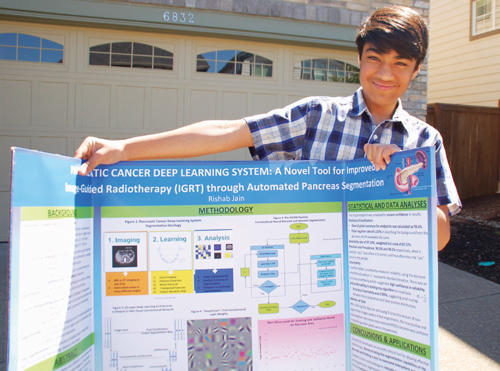(March 24, 2023) He was just 13 when he won the Discovery Education 3M Young Scientist Challenge for coming up with an algorithm that uses artificial intelligence to help doctors target the pancreas during cancer treatment. Meet Portland-born-and-raised Rishab Jain, who is currently a research intern at Massachusetts Institute of Technology. The young Indian American has created an algorithm could change the way doctors target the pancreas while treating cancer, as they are difficult to spot due to their movement.
Currently, doctors target radiation in the area they believe the pancreas is, in the process also killing other healthy cells. “In the radiotherapy treatment where radiation is applied to kill tumour cells, my tool tracks the pancreas in the scan itself. When the radiation hits, it hits the pancreas accurately and efficiently so it can help treat the tumour much more effectively,” the 17-year-old told TIME.

Rishab Jain
It was in the summer of 2017 that Rishab, who is among TIME’s 25 Most Influential Teens, first became interested in pancreatic cancer during his trip to Boston to meet his brother, where he learnt about the low survival rate and its deadliness. It is the third leading cause of cancer-related deaths in the US and is the eighth most common cancer in women. In India, it has a 98 percent mortality rate, says Rishab.
“Currently, pancreatic cancer is detected in a late stage, and by then, doctors try to use radiotherapy to help treat it, but most of the time, it’s not effective enough, so I got inspired to do some research on this because I’m a big programmer, and I like artificial intelligence, so I wondered if I could combine my knowledge in the two areas to help solve the problem,” the Global Indian said at TedTalk. That’s what led to the creation of an AI-based tool called PCDLS (pancreatic cancer deep learning system) Net to improve pancreas tracking during a treatment called radiotherapy for pancreatic cancer.


In the process, he contacted 253 doctors and received replies from 30 leading experts from institutions at cancer centres and around the world. He found that it’s hard to find the exact location of the pancreas, as the stomach and liver cover most of the area. During the radiation, millions of healthy cells are also affected by collateral damage. “My tool is able to reduce that area to around four millimetres, so that saves millions of healthy cells and can improve patient quality of care,” he added.
The teenager is of the opinion that his algorithm can be incorporated in the hospital’s existing radiography equipment or be incorporated directly into new machines, and is in touch with doctors in implementing the idea.
Rishab, who also won the 2022 Regeneron Science Talent Search, wants to become a biomedical engineer and help make a difference in other people’s lives. He is also the founder of a non-profit, Samyak Science Society, which helps promote STEM learning for children who didn’t have the same opportunity as him and raise pancreatic cancer awareness.
- Follow Rishab Jain on LinkedIn

